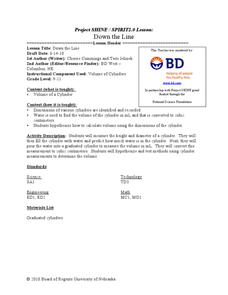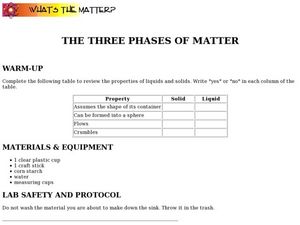Utah Education Network (UEN)
Recipe Terminology Hunt
As your young learners develop into cooking enthusiasts, ensure their success in creating their next culinary masterpiece by preparing them to read and understand basic recipe terminology.
Food a Fact of Life
Soup-er!
Is there anything better than hot soup on a cold day? Kids prepare either vegetable chowder or minestrone soup in an activity that features the use of the stove top.
Nuffield Foundation
No Stomach for It: Investigating Antacid Medication
You won't get a stomachache doing an investigative experiment. Pupils simulate the effect of antacids on stomach acid. Obviously, they won't be using real stomach acid; diluted hydrochloric acid serves this purpose.
Curated OER
How Does the Heart Work?
In this How Does the Heart Work worksheet, students write a short explanation of how the heart works based on 7 phrases given. Students also participate in 2 extension activities.
Curated OER
Earth's Water: A drop in your cup
Students complete activities where they observe the amount of freshwater in the world as a fraction of the actual amount of water using different mixtures. In this freshwater lesson plan, students brainstorm on how to preserve...
Worksheet Web
Let it Snow
After reading an informational text detailing the ins and outs of snowflakes, scholars draw their own special design then work cooperatively to role play a snowman building scenario.
Mathematics Assessment Project
Glasses
Clink, clink! Young mathematicians investigate drinking glasses composed of known solids (cones, cylinders, and hemispheres). Next, they determine the volumes of these glasses.
Chymist
Earth Science
Explore the consistency of the earth's layers and soil through modeling. By conducting an engaging experiment, learners develop a model for the earth's layers and a soil profile using edible materials. Each material is chosen based on...
LABScI
Freezing Point Depression: Why Don’t Oceans Freeze?
Can you go ice fishing in the ocean? Learners examine the freezing point of different saltwater solutions. Each solution has a different concentration of salt. By comparing the freezing points graphically, they make conclusions...
Cornell University
Making a Battery
Don't be shocked when your class has a blast making their own batteries! Science scholars examine a dry cell battery, then design and construct a wet cell battery. The activity guides them through the parts of a battery, the variables...
Cornell University
Sound Off!
Time to witness the effects of sound. Learners analyze different materials to determine their abilities to absorb sound waves. They use free software to monitor the amplitude of the waves to verify results.
Cornell University
Atomic Bonding
Explore the connection of surface area to bonding within atoms. Learners complete lab investigations to model changing surface area with different sizes and concentrations of atoms. A flour fireball demonstration follows the labs to...
Curated OER
What is the Best Solution to Dye Easter Eggs?
Students use red and blue litmus paper to determine the category of common substances. They then set up an experiment using vinegar, water, and ammonia (or milk of magnesia) to determine that acids make the best solution for dyeing...
Curated OER
Kitchen Equip and Lab Procedures - Level I
Students, in groups, record at least four pieces of equipment that fit a specified category as well as a safety tip to observe when using the equipment.
Curated OER
A Serving By Any Other Name
Young scholars examine the information given on food labels. They also discover what a serving size is and determine how much they eat over the suggested serving. They also calculate the number of calories are in different foods.
Curated OER
Water and Ice
Pupils explore water and how it changes forms. In this investigative lesson students participate in an activity that shows them how water changes form and what it looks and feels like.
Curated OER
Down The Line
Learnersinvestigate three-dimensional shapes. In this geometry lesson plan, pupils calculate the volume of cylinders using the given dimensions. They create a formula base don observation before using the real formula.
Curated OER
Unit 1 Matter and Energy
Topping this worksheet is a comprehensive collection of notes about phase changes. The phase change graph is displayed, along with formulas for the gas laws, and information relating energy to change of phase. After reviewing these...
Oregon Museum of Science and Industry (OMSI)
DNA Extraction
What does your DNA actually look like? Use simple materials with this experiment to find out! Geneticists of all ages can follow these instructions to extract their own DNA. For learners who are hoping to extend the activity, there are...
Curated OER
Matter, Matter, Everywhere!
Eighth graders make inquiry about the existence of matter. A definition of the word is needed before students can engage in various activities. The application of knowing about matter is done in the working of experiments.
Curated OER
The Three Phases of Matter
To study the phases of matter, students complete an experiment including water and corn starch and answer six short answer questions about the states of matter the observed.
Shodor Education Foundation
Volume of Prisms
Explore the concept of volume of prisms using an applet to perform the calculations. The link to the interactive applet is embedded into the lesson plan as well as a link to associated data sheets. Get your math class to the computer lab...
Curated OER
Volume of Rectangular Prisms
Introduce the procedure needed to find the volume of a rectangular prism. Learners rank various prisms such as cereal boxes and tissue boxes from smallest to largest volume. They use an applet to find the volume and surface area of each...
Curated OER
Water Monitoring Vocabulary
As the title implies, this is a list of vocabulary terms relating to water monitoring. If your ecology class is learning about how to test water quality, this will be an appropriate reference sheet for them. As a bonus, if you live in...
Other popular searches
- Liquid Measurement Chart G
- Liquid Measurement Chart
- Volume Liquid Measurement
- Liquid Measurement Activity
- Standard Liquid Measurement
- Liquid Measurement Tools
- Liquid Measurement in Math
- Metric Liquid Measurement
- Liquid Measurement Chart G"4
- Liquid Measurement Worksheet
- Using Liquid Measurement
- Liquid Measurement Gill























